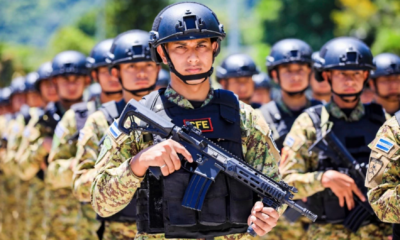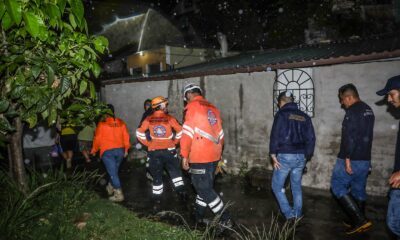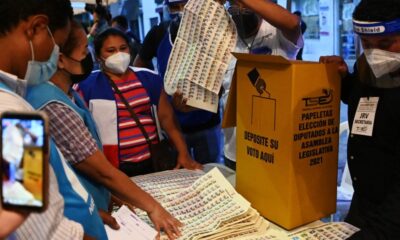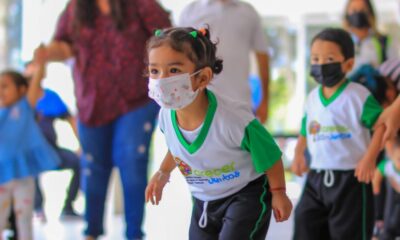Central America
Territorial Control Plan of the Salvadoran Government is four years old
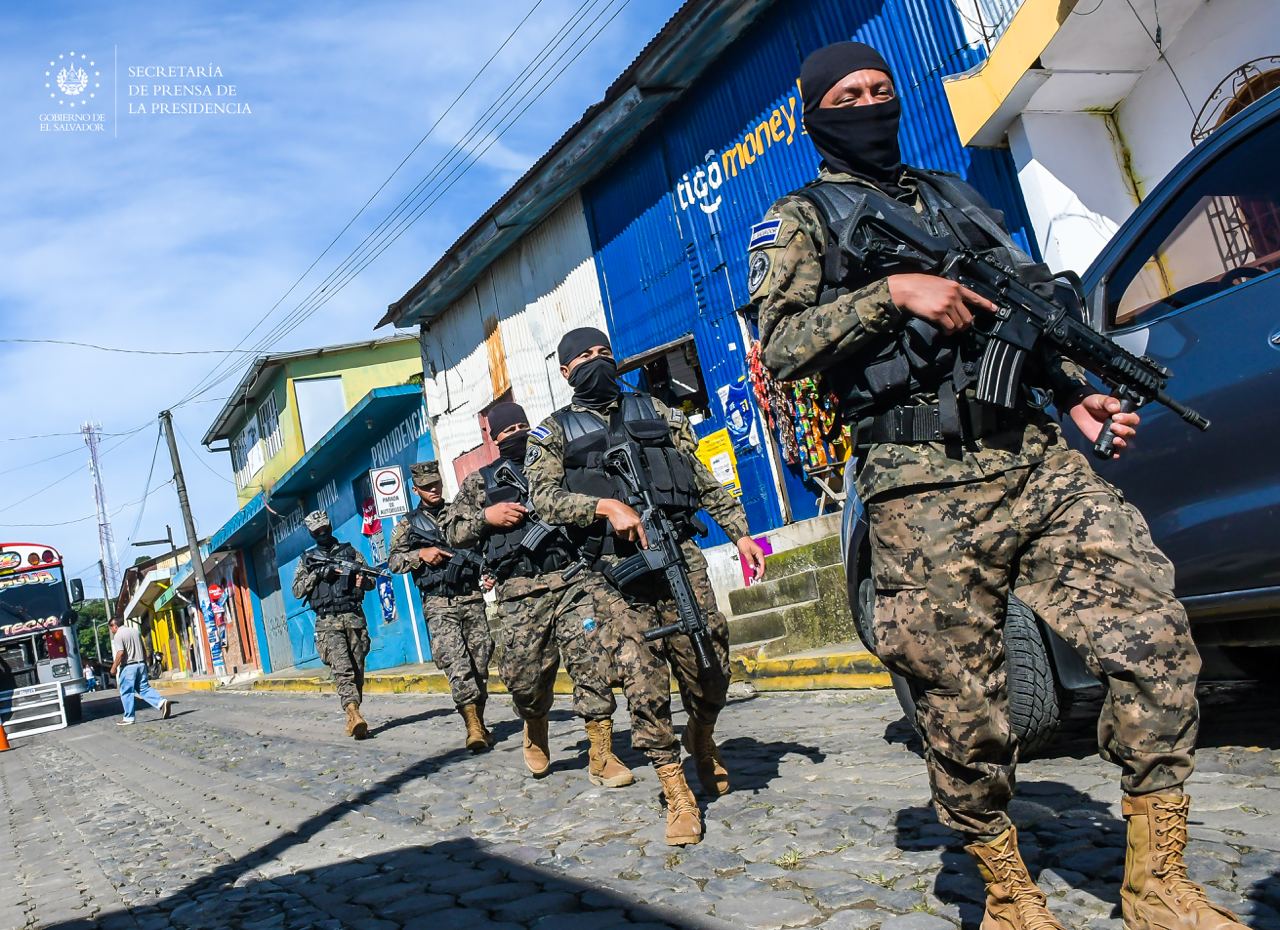
June 20 |
President Nayib Bukele’s successful security strategy, through the Territorial Control Plan (PCT), has been implemented for four years with irrefutable results and benefits for the honest population that for many years was under the stalking of terrorist structures.
The sustained drop in homicides, the drastic reduction of extortions, disappearances, forced displacements, robberies and other high impact crimes are proof of the results of the security plan implemented by the Salvadoran president since June 20 when he launched Phase I of the PCT called Preparation, in which police presence in the communities was increased with patrols in areas of high crime incidence.
On the occasion of the four-year anniversary, the Minister of Justice and Public Security, Gustavo Villatoro, stated that what seemed impossible has become a reality in El Salvador. “As President Nayib Bukele has already said, we regained control of Salvadoran territory, our country left the list of the most dangerous countries in the world, we have returned true freedom, hope, peace and joy to millions of Salvadorans”.
He added that in four years of implementation of the PCT they have achieved unprecedented results and that is why they continue to work for the honest population.
With the implementation of the first stage of the plan, the decrease in high incidence crimes was evident and by July 2, 2019 the authorities implemented Phase 2 known as Opportunities with which 12 CUBOs have been built in which opportunities are generated for young women and the social fabric is rebuilt.
On July 30 of the same year, Phase 3, known as Modernization, was launched, which consists of dignifying the police career, improving the equipment of the PNC and providing the Armed Forces with new equipment. On July 19, 2021, Phase 4, known as Incursion, was implemented, in which police and military teams entered the territories to eradicate criminal groups; there was also the incorporation of new members in the PNC and FAES.
To reinforce the PCT and to eradicate the different terrorist organizations, the Head of State and his Security Cabinet implemented the Exception Regime, which further reduced the homicide rate and other illegal activities. Between March 27, 2022 and June 20 of this year, more than 70,000 gang members were arrested and 380 days without homicides were recorded.
Phase 5 called Extraction was launched on November 23, 2022 and military and police fences were established for a total recovery of the territories, order was restored and vulnerable communities were reactivated.
Central America
U.S. and Guatemala Sign Trade Deal Granting Zero Tariffs to Most Exports

The United States signed a reciprocal trade agreement with Guatemala on Friday, under which 70.4% of Guatemalan exports will enter the U.S. market tariff-free.
Guatemalan President Bernardo Arévalo highlighted the importance of the agreement, stating that it creates a framework of cooperation, certainty, and new opportunities for producers, workers, and entrepreneurs in the country. His remarks were shared in a video published on his official social media channels.
In 2025, 30.3% of Guatemala’s total exports were destined for the United States, amounting to approximately $4.3 billion. As a result, the agreement is expected to directly benefit key sectors of the Guatemalan economy, including agribusiness, manufacturing, and the textile industry.
“Today we have taken another step toward consolidating a country that, when it moves forward united, generates confidence, attracts investment, and creates real development opportunities for all its people,” Arévalo added.
The agreement with Guatemala follows a similar trade deal signed by the United States with El Salvador on Thursday, which includes the elimination of a 10% tariff on Salvadoran imports.
Central America
Panama Supreme Court Strikes Down Panama Ports Concession as Unconstitutional

Panama’s Supreme Court of Justice has ruled unconstitutional the concession contract granted in 1997 to Panama Ports Company (PPC), a subsidiary of the Chinese conglomerate CK Hutchison, which operates two strategic ports along the interoceanic canal. The decision was announced on Thursday, January 29, 2026, following two lawsuits filed by the Comptroller General’s Office.
The ruling directly affects the management of the ports of Balboa, on the Pacific coast, and Cristóbal, on the Atlantic side, both of which have been operated by the company for nearly three decades. According to Panama’s Comptroller General, Anel Flores, an audit uncovered irregularities in the contract that resulted in more than $1.3 billion failing to enter state coffers.
“It is a predatory contract, abusive to the interests of the country,” Flores stated.
The Supreme Court determined that Law 5 of 1997, its subsequent amendments, and the automatic extension granted in 2021 are unconstitutional. The ruling noted that the contract renewal took place without adequate oversight and amid allegations of corruption, despite the Panamanian state holding only a 10% stake in the company.
Central America
Guatemala President Says Starlink Terminal Found Inside Prison

Guatemalan President Bernardo Arévalo revealed on Tuesday that a Starlink terminal was discovered inside a prison in the country, highlighting corruption and the illegal introduction of advanced communication technology into the penitentiary system.
Arévalo did not specify which prison the device was found in but stressed that Starlink’s ability to connect directly to low-orbit satellites makes it particularly difficult to disrupt, posing a serious security risk.
The disclosure was made during a press conference attended by Interior Minister Marco Antonio Villeda and Defense Minister Henry Sáenz.
On January 6, specialized units of Guatemala’s National Civil Police (PNC), members of the Army and prison security personnel carried out Operation Sentinel at the Renovación 1 Maximum Security Prison for Men, located in Escuintla. According to the Interior Ministry, the operation aimed to reduce criminal activity, prevent illicit acts and stop the trafficking of prohibited items inside the prison.
During the operation, authorities also dismantled businesses operating near several prisons after detecting routers that were allegedly used to redirect internet signals into penitentiary facilities, according to local outlet Emisoras Unidas.
Tensions escalated further over the weekend of January 17 and 18, when inmates affiliated with gangs staged riots in three prisons. During the unrest, they took prison guards and a psychologist hostage, demanding extra-large beds, air conditioning, transfers to other facilities and access to the internet.
-

 Central America5 days ago
Central America5 days agoGuatemala seizes over a ton of cocaine hidden in flour at Pacific port
-

 Central America4 days ago
Central America4 days agoGuatemala Police Arrest Prison Guard Caught in the Act of Extortion
-

 Central America4 days ago
Central America4 days agoHonduras swears in conservative president Asfura after disputed election
-

 International5 days ago
International5 days agoHistoric snowstorm paralyzes Toronto after 60 centimeters of snow
-

 Central America4 days ago
Central America4 days agoBukele leads public trust rankings as UCA survey highlights gains in security
-

 International3 days ago
International3 days agoFootball Fan Killed in Clashes After Colombian League Match
-

 International5 days ago
International5 days agoSpain’s irregular migrant population rises to 840,000, study finds
-

 Central America3 days ago
Central America3 days agoGuatemala President Says Starlink Terminal Found Inside Prison
-

 International4 days ago
International4 days agoDoomsday clock moves to 85 seconds before midnight amid rising global risks
-

 International4 days ago
International4 days agoWinter Storm Fern Leaves 30 Dead and Over One Million Without Power Across the U.S.
-

 International2 days ago
International2 days agoU.S. Senate Rejects Budget, Bringing Government Closer to Shutdown Amid DHS Dispute
-

 Sin categoría4 days ago
Sin categoría4 days agoEight Killed in Series of Armed Attacks in Ecuador’s Manabí Province
-

 International4 days ago
International4 days agoSpain approves plan to regularize up to 500,000 migrants in Historic Shift
-

 International5 days ago
International5 days agoRights group says nearly 6,000 killed in Iran protest crackdown
-

 International3 days ago
International3 days agoRubio Says U.S. Could Participate in Follow-Up Russia-Ukraine Talks
-

 International3 days ago
International3 days agoMissing Spanish Sailor Rescued After 11 Days Adrift in Mediterranean
-

 Sin categoría4 days ago
Sin categoría4 days agoEl Salvador Launches Fourth Year of Ocean Mission to Protect Marine Ecosystems
-

 Central America14 hours ago
Central America14 hours agoPanama Supreme Court Strikes Down Panama Ports Concession as Unconstitutional
-

 International5 days ago
International5 days agoVenezuela frees at least 80 political prisoners, NGO says
-

 International5 days ago
International5 days agoEU launches new probe into X over AI-generated fake nude images
-

 International2 days ago
International2 days agoStorm Kristin Kills Five in Portugal, Leaves Nearly 500,000 Without Power
-

 Central America14 hours ago
Central America14 hours agoU.S. and Guatemala Sign Trade Deal Granting Zero Tariffs to Most Exports
-

 International2 days ago
International2 days agoTrump Says Putin Agreed to One-Week Halt in Attacks on Ukraine Amid Extreme Cold
-

 International2 days ago
International2 days agoMan Arrested After Vehicle Crashes Into Jewish Institution in Brooklyn
-

 International5 days ago
International5 days agoSevere winter storm grips U.S., leaves multiple dead as extreme cold persists
-

 International5 days ago
International5 days agoFrance debates ban on social media for children under 15



















































































